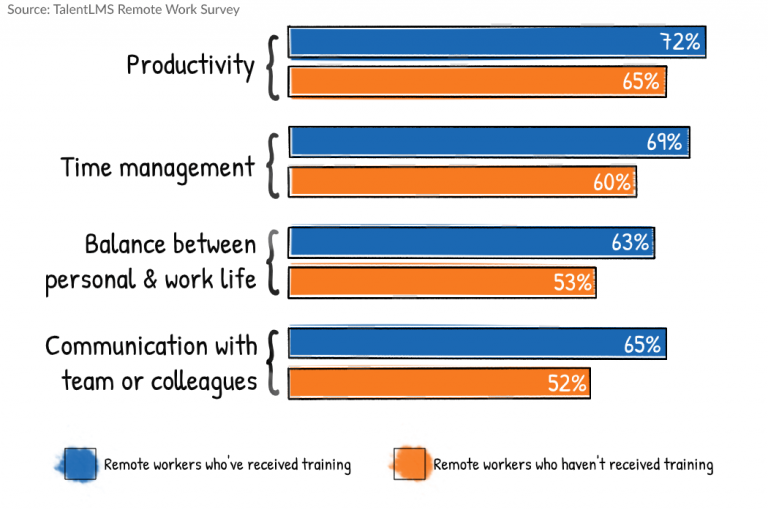Protecting your remote employees’ mental health and encouraging them to stay fit should be one of your priorities. Creating an employee wellness program will bring a range of benefits to your business.
Working from home has a lot of advantages, both for a worker and the employer. Working from home removes the commute and creates more time for employees to do household and family chores. For employers, remote working means spending less on office rentals, electricity, and other work-related expenses.
However, remote working comes with challenges related to employee wellness. Many employees report a feeling of isolation from their team. Sheltering in place can make employees feel claustrophobic and unproductive. As it becomes new “normal” to have remote team members, it should also be standard for the company to look after their mental and physical health.
You need to know the kind of virtual wellness programs you can offer your employees to handle this situation. Here are some things to include in your employee wellness program that can help you get that happy remote team:
1. Organize after-work virtual gatherings
Organizing after-work virtual gatherings can reduce that feeling of isolation and improve the connection between colleagues. A few ideas for a virtual fun time include:
- “Campfire” meeting
- Virtual Friday night party with drinks
- Book club meeting
- Virtual tour of an exciting place or a museum
- Quiz night
To find out what your employees are into, you can do an anonymous survey. Don’t forget to ask for feedback on recently hosted events and get ideas for future ones.
2. Create a virtual social environment
Many remote workers struggle with a feeling of isolation. It’s often a bigger issue for people who have suddenly had to swap from being in the office every day to remote.
To look after your team’s mental health, you should provide a space where people can share their thoughts and anxieties. As a leader, you should assure them that they can share their thoughts discretely or in group sessions.
The important thing is to keep social contact between your employees alive. It doesn’t matter what they talk about, as long as nobody feels isolated or alone.
You could start by creating a monthly health and wellbeing club. Keep your team updated on the events via emails, notes, or group messages. After a couple of months, decide if one meeting a month is enough or if you need more meetings.
Encourage your team members to look after each other too. Trinity Counseling Service identifies isolation and burnout as the main struggles for remote workers. They posted the below message on their Facebook page with tips on how to help to look after mental health while working from home:

Source
Be flexible when creating a wellness program for your team members. Offer regular social webchats, stream health sessions and encourage them to ask for help if they need it. If your company offers a mental health program, always remind your team that they can schedule free consultations and even take time off when they need a mental health break.
Don’t feel like you have to be the host for such events every time. Come up with an exciting wellness program by offering different online classes like Yoga or fitness sessions. Motivate your employees to share their healthy food or workout routine with their colleagues.
3. Offer relevant training and tools
Each of your team members has a job to do. As a manager, Ensure that your team has the tools like an it service desk and resources to do their jobs. This also includes training both for general skills and specific roles. If your team receives the tools and training they need, they can do their jobs more efficiently and preserve their mental well-being as well.
According to a survey conducted by TalentLMS, remote employees who received training reported being more productive overall. They also claimed to manage their time and balance their personal and work-life better. The same survey also revealed that employee training improved team communication.

Source
Aside from training your employees on the processes to follow, you also need to provide them with the right tools for the job. For example, a team of writers will be more productive if they have software that can check for grammar errors on the fly instead of having to reread entire articles before submitting them.
In addition to providing training and tools, you should adjust your processes to accommodate remote workers. Many businesses have gone paperless, not just because they want to save the trees but also because it’s more practical to create timesheets using shift planning tools rather than plot shifts on paper and distribute them through the mail.
While these changes seem trivial, you cannot underestimate the positive impact on your team’s productivity and well-being.
4. Provide counseling sessions
Virtual meetings and fun activities may not be enough for some employees outside work. It’s an employer’s role to identify the needs of their remote team and offer mental health support for those who struggle.
Make it easier to reach out to qualified professionals if they need it. In most cases, it’s not obvious who needs help, especially when it comes to remote workers. Therefore, you should roll out anonymous wellbeing surveys. Send them out regularly and at least twice a year.
Look out for problems with stress, loneliness, fatigue, lack of motivation. When you identify the most common difficulties, you can think of relevant solutions and offer them to the group.
Providing information such as helpline numbers, email addresses, or dedicated website links is the minimum an employer should do for their workers. Some businesses offer access to online therapy or counseling as an employee benefit.
5. Give alternatives to in-office benefits
You might be surprised to know that 42% of full-time employees have no employee perks at all. However, research shows that office perks, such as free pizza on Fridays or free fruit for employees, positively impact employee morale.
However, remote working has made many in-office perks impractical, especially for teams distributed across different locations. This has made thinking of alternatives to in-office perks necessary in today’s working environment. For instance, some companies register their employees to fruit subscription box services instead.
In addition, many businesses also encourage their employees to stay fit by offering discounts or reimbursements on gym memberships. This strategy works well because many remote workers tend to stay seated for long periods without breaks to stretch their muscles.
Finally, you can set aside a budget and let your employees choose what they want from a list of pre-approved perks. These can include office equipment, professional development courses, or even working lunches.
Bottomline
Remote working is no longer a novelty. While employers were forced to shift to a remote working setup due to the pandemic, many employers choose to stay in the same setup due to its advantages, such as lower costs and higher productivity. However, this should not come at the expense of employees’ mental and physical health.
Employee wellness programs are intended to ease your team’s workload and keep them healthy and engaged. Because many wellness programs were created with the assumption that your team will work on-site, it’s time to design new programs centered around remote teams.
For instance, you can plan virtual gatherings after working hours or set aside a specific day just for these events. These can include book club meetings, virtual visits to interesting sites, team lunches, or after-work drinks.
You can also create a virtual social environment where your employees can feel free to speak their minds, offer personal and professional development training, and provide counseling sessions for those who feel overwhelmed by the demands of work and home. Finally, create alternative perks to replace those you had to give up due to the shift to remote working.
Remember that your wellness programs are supposed to bring comfort and be fun. The more your employees will feel looked after. The happier and more productive they will be.
Looking For HR Management System?
Call Pursho @ 0731-6725516
Telegram Group One Must Follow :
For Startups: https://t.me/daily_business_reads







